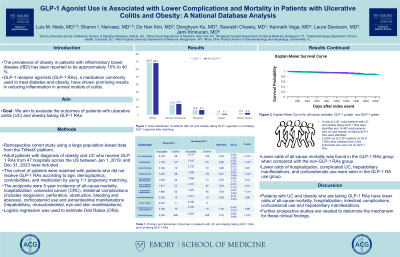Sunday Poster Session
Category: IBD
P0840 - GLP-1 Agonist Use is Associated With Lower Complications and Mortality in Patients With Ulcerative Colitis and Obesity: A National Database Analysis
Sunday, October 27, 2024
3:30 PM - 7:00 PM ET
Location: Exhibit Hall E

Has Audio

Luis M. Nieto, MD
Emory University School of Medicine
Atlanta, GA
Presenting Author(s)
Luis M.. Nieto, MD1, Sharon Narvaez, MD2, Do Han Kim, MD3, Donghyun Ko, MD4, Saurabh Chawla, MD1, Kenneth Vega, MD, FACG5, Laura Davisson, MD6, Jami A. Kinnucan, MD, FACG7
1Emory University School of Medicine, Atlanta, GA; 2Universidad de Guayaquil, School of Medicine, Atlanta, GA; 3Mount Sinai Morningside and West, Icahn School of Medicine at Mount Sinai, New York, NY; 4Yale-New Haven Health/Bridgeport Hospital, Bridgeport, CT; 5Medical College of Georgia at Augusta University, Augusta, GA; 6West Virginia University, Morgantown, WV; 7Mayo Clinic, Jacksonville, FL
Introduction: The prevalence of obesity in patients with inflammatory bowel disease (IBD) has been reported to be approximately 15% to 40 %. GLP-1 receptor agonists (GLP-1 RAs), a medication commonly used to treat diabetes and obesity, have shown promising results in reducing inflammation in animal models of colitis. Therefore, we aim to evaluate the outcomes of patients with ulcerative colitis (UC) and obesity taking GLP-1 RAs.
Methods: We performed a retrospective cohort study utilizing large population-based data from the TriNetX platform. We identified patients with obesity (BMI of 30 or greater) and UC who received GLP-1 RAs (semaglutide, liraglutide, dulaglutide and tirzepatide) between January 1, 2019, and December 31, 2023. This cohort of patients was matched with UC patients who did not receive GLP-1 RAs according to age, demographics, comorbidities, and medication by using 1:1 propensity matching. The endpoints were 5-year incidence of all-cause mortality, hospitalization, colorectal cancer (CRC), intestinal complications (includes megacolon, perforation, obstruction, bleeding and abscess), corticosteroid use and extraintestinal manifestations (hepatobiliary, musculoskeletal, eye and skin manifestations). Logistic regression was used to estimate Odd Ratios (ORs).
Results: A total of 16,783 adult patients with UC and obesity were identified, 2,301 of these individuals were taking GLP -1 RAs; 2,204 out of 2,301 (mean [SD] age, 58.8 [11.7] years; 1,232 [55.8%] female) were matched with 2,204 individuals (mean [SD] age, 58.5 [14.2] years; 1,240 [56.2%] female) who did not take GLP-1 RAs. The GLP-1 RAs group had significant lower odds of all-cause mortality (ORs, 0.38; 95% Confidence Interval [CI], 0.28-0.53), lower odds of hospitalization (ORs, 0.66; 95% CI, 0.52-0.85), lower odds of intestinal complications (ORs, 0.47; 95% CI, 0.34-0.66), lower odds of corticosteroid use (ORs, 0.75; 95% CI, 0.66-0.85), and hepatobiliary manifestations (cholangitis, bile duct carcinoma and cholelithiasis, ORs, 0.38; 95% CI, 0.23-0.63) when compared with the non- GLP -1 RAs group. No differences were found in the incidence of CRC and other extraintestinal manifestations.
Discussion: Patients with UC and obesity who are taking GLP-1 RAs have lower odds of all-cause mortality, hospitalization, intestinal complications, corticosteroid use and hepatobiliary manifestations. Further prospective studies are needed to determine the mechanism for these clinical findings.
Note: The table for this abstract can be viewed in the ePoster Gallery section of the ACG 2024 ePoster Site or in The American Journal of Gastroenterology's abstract supplement issue, both of which will be available starting October 27, 2024.
Disclosures:
Luis M.. Nieto, MD1, Sharon Narvaez, MD2, Do Han Kim, MD3, Donghyun Ko, MD4, Saurabh Chawla, MD1, Kenneth Vega, MD, FACG5, Laura Davisson, MD6, Jami A. Kinnucan, MD, FACG7. P0840 - GLP-1 Agonist Use is Associated With Lower Complications and Mortality in Patients With Ulcerative Colitis and Obesity: A National Database Analysis, ACG 2024 Annual Scientific Meeting Abstracts. Philadelphia, PA: American College of Gastroenterology.
1Emory University School of Medicine, Atlanta, GA; 2Universidad de Guayaquil, School of Medicine, Atlanta, GA; 3Mount Sinai Morningside and West, Icahn School of Medicine at Mount Sinai, New York, NY; 4Yale-New Haven Health/Bridgeport Hospital, Bridgeport, CT; 5Medical College of Georgia at Augusta University, Augusta, GA; 6West Virginia University, Morgantown, WV; 7Mayo Clinic, Jacksonville, FL
Introduction: The prevalence of obesity in patients with inflammatory bowel disease (IBD) has been reported to be approximately 15% to 40 %. GLP-1 receptor agonists (GLP-1 RAs), a medication commonly used to treat diabetes and obesity, have shown promising results in reducing inflammation in animal models of colitis. Therefore, we aim to evaluate the outcomes of patients with ulcerative colitis (UC) and obesity taking GLP-1 RAs.
Methods: We performed a retrospective cohort study utilizing large population-based data from the TriNetX platform. We identified patients with obesity (BMI of 30 or greater) and UC who received GLP-1 RAs (semaglutide, liraglutide, dulaglutide and tirzepatide) between January 1, 2019, and December 31, 2023. This cohort of patients was matched with UC patients who did not receive GLP-1 RAs according to age, demographics, comorbidities, and medication by using 1:1 propensity matching. The endpoints were 5-year incidence of all-cause mortality, hospitalization, colorectal cancer (CRC), intestinal complications (includes megacolon, perforation, obstruction, bleeding and abscess), corticosteroid use and extraintestinal manifestations (hepatobiliary, musculoskeletal, eye and skin manifestations). Logistic regression was used to estimate Odd Ratios (ORs).
Results: A total of 16,783 adult patients with UC and obesity were identified, 2,301 of these individuals were taking GLP -1 RAs; 2,204 out of 2,301 (mean [SD] age, 58.8 [11.7] years; 1,232 [55.8%] female) were matched with 2,204 individuals (mean [SD] age, 58.5 [14.2] years; 1,240 [56.2%] female) who did not take GLP-1 RAs. The GLP-1 RAs group had significant lower odds of all-cause mortality (ORs, 0.38; 95% Confidence Interval [CI], 0.28-0.53), lower odds of hospitalization (ORs, 0.66; 95% CI, 0.52-0.85), lower odds of intestinal complications (ORs, 0.47; 95% CI, 0.34-0.66), lower odds of corticosteroid use (ORs, 0.75; 95% CI, 0.66-0.85), and hepatobiliary manifestations (cholangitis, bile duct carcinoma and cholelithiasis, ORs, 0.38; 95% CI, 0.23-0.63) when compared with the non- GLP -1 RAs group. No differences were found in the incidence of CRC and other extraintestinal manifestations.
Discussion: Patients with UC and obesity who are taking GLP-1 RAs have lower odds of all-cause mortality, hospitalization, intestinal complications, corticosteroid use and hepatobiliary manifestations. Further prospective studies are needed to determine the mechanism for these clinical findings.
Note: The table for this abstract can be viewed in the ePoster Gallery section of the ACG 2024 ePoster Site or in The American Journal of Gastroenterology's abstract supplement issue, both of which will be available starting October 27, 2024.
Disclosures:
Luis Nieto indicated no relevant financial relationships.
Sharon Narvaez indicated no relevant financial relationships.
Do Han Kim indicated no relevant financial relationships.
Donghyun Ko indicated no relevant financial relationships.
Saurabh Chawla indicated no relevant financial relationships.
Kenneth Vega indicated no relevant financial relationships.
Laura Davisson indicated no relevant financial relationships.
Jami Kinnucan: Abbvie – Advisory Committee/Board Member, Consultant. Fresinius kabi – Advisory Committee/Board Member, Consultant. J&J – Advisory Committee/Board Member, Consultant. Lilly – Advisory Committee/Board Member. Pfizer – Advisory Committee/Board Member, Consultant. Takeda – Advisory Committee/Board Member, Consultant. UCB – Consultant.
Luis M.. Nieto, MD1, Sharon Narvaez, MD2, Do Han Kim, MD3, Donghyun Ko, MD4, Saurabh Chawla, MD1, Kenneth Vega, MD, FACG5, Laura Davisson, MD6, Jami A. Kinnucan, MD, FACG7. P0840 - GLP-1 Agonist Use is Associated With Lower Complications and Mortality in Patients With Ulcerative Colitis and Obesity: A National Database Analysis, ACG 2024 Annual Scientific Meeting Abstracts. Philadelphia, PA: American College of Gastroenterology.
